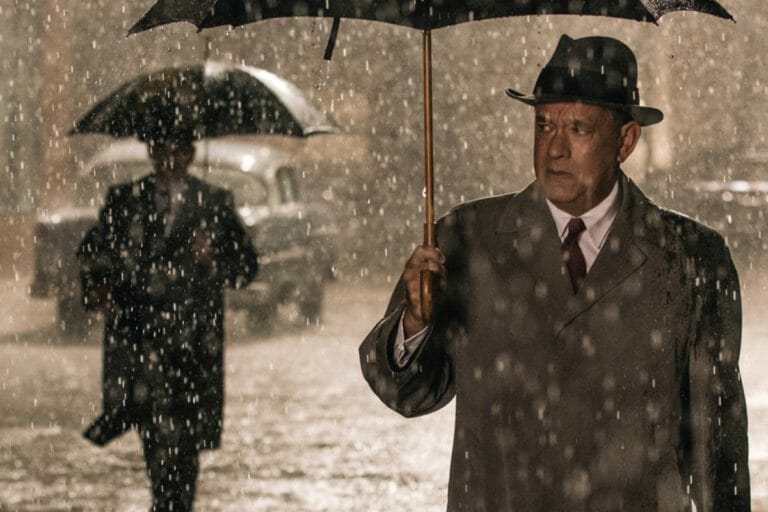By Christopher Ortiz · October 18, 2015

Tom Hanks and Steven Spielberg team up once again for Bridge of Spies, delivering an engaging Cold War espionage thriller that sets itself apart through well-crafted thrills and old-fashioned drama. Not quite as dark as some might expect given the material, Bridge of Spies tells the true story of insurance agent James B. Donovan and his role in the famous 1962 U-2 spy plane incident, which led to the controversial exchange of captive spies on a bridge in Germany. It succeeds as a stylish, modern spy drama that resonates with America’s concerns over national security.
Critics of Spielberg – from his lighthearted cheesiness, and whimsical musical scores, to the classic “Spielberg face” – may find themselves surprised by the restraint he shows here. Bridge of Spies is a tightly focused take on its source material, with little extraneous content. Those who recall fondly the political thrillers of the ‘70s and the suspense-dramas of the ‘50s will definitely appreciate the decidedly vintage-Hollywood style on display. The events feel surprisingly relatable to a modern political climate, and the script’s message about holding onto ideals in the face of accusation and persecution rings true by the finale.
The film begins in 1957 — Americans live in paranoia of enemy spies and the lingering threat of nuclear holocaust; schools play propaganda films and children are provided with step-by-step guides for navigating impending doom. Following the arrest of Rudolph Abel, a painter accused of spying for the Russians, James Donovan (Hanks) is brought in as the defense given his proven track record at the Nuremberg trials. Donovan is just about as baffled by the prospect of defending an accused spy as he is fearful of the imminent public outcry, but he’s soon reminded that everyone deserves a fair trial.
Unfortunately, the fear of the Russians’ growing power begins to chip away at due process. As Donovan begins to suspect that the outcome of the case is a foregone conclusion, he relies more and more on his own reasons for defending Abel. Later, the film takes us to Europe following the crash of a U-2 spy plane manned Francis Gary Powers. Unsurprisingly, it’s up to Donovan to negotiate Powers’ release. The resulting film is something of a fusion between a court room drama and an espionage thriller with nary a change in cast. Fortunately, the two genres go well together thanks mostly to a consistency of character and theme. The result is an expectedly fine outing from Spielberg with the title of the film transforming from the metaphorical to the physical as the snowy exchange in Germany grows near.
Hanks appears in just about every scene, adding his unique brand of charisma and vulnerability. His likeable everyman performance positions itself as another major awards contender for this coming season. In the same vein as Captain Phillips, Hanks plays an everyday character thrust into dangerous circumstances (although Bridge of Spies is admittedly neither as intense nor demanding). That said, there remains just enough tension to keep audiences present and engaged – another pair of watchful eyes beyond Donovan’s usual CIA escort. While neither a particularly dark thriller nor a lighthearted drama, Spielberg’s direction wisely plays up the stakes and instills an atmosphere of unpredictability. Events remain compelling despite the fact that the ending is a relatively well-known historical footnote.
The stylish visuals, courtesy of Spielberg’s long time cinematographer Janusz Kaminski, make this one of the best looking dramas of the year. The camerawork, even in slow-burn sequences land, feels assured and even inspired. Nearly every shot is farmable, and wouldn’t look out of place displayed in a public institution or a museum. The script, penned by the Coen Brothers and Mark Charman, empowers the actors to the sell the climate of fear and paranoia, rather than relying on directorial flourishes and gimmicks. The result is that Bridge of Spies feels stylish, yet authentic, earning it a comfortable, if not groundbreaking, place amidst its political thriller brethren.
The one downside is that some may find the film lacking in emotional drama. That said, this is a dense story – there’s a lot for Hanks and company to get through despite shortchanging veterans like Alan Alda and Amy Ryan, who plays Donovan’s fear-consumed wife. There’s some family drama here, though some of it is played for laughs (humorous dinner table conversations concerning Donovan’s continuing defense of Abel, for example), and the film never dives deeply into the complexities of Donovan’s character and why he acts the way he does. Some may find this problematic while others will be too absorbed by the stakes, which are understandably nerve-racking for these characters.
Bridge of Spies is yet another fine film from Steven Spielberg; a quietly compelling one that taps into national security fears and highlights the significance of holding onto your ideals no matter the cost. The cinematography and performances are the greatest strengths here, alongside the film’s ability to combine murky politics and espionage with a lasting message of hope.